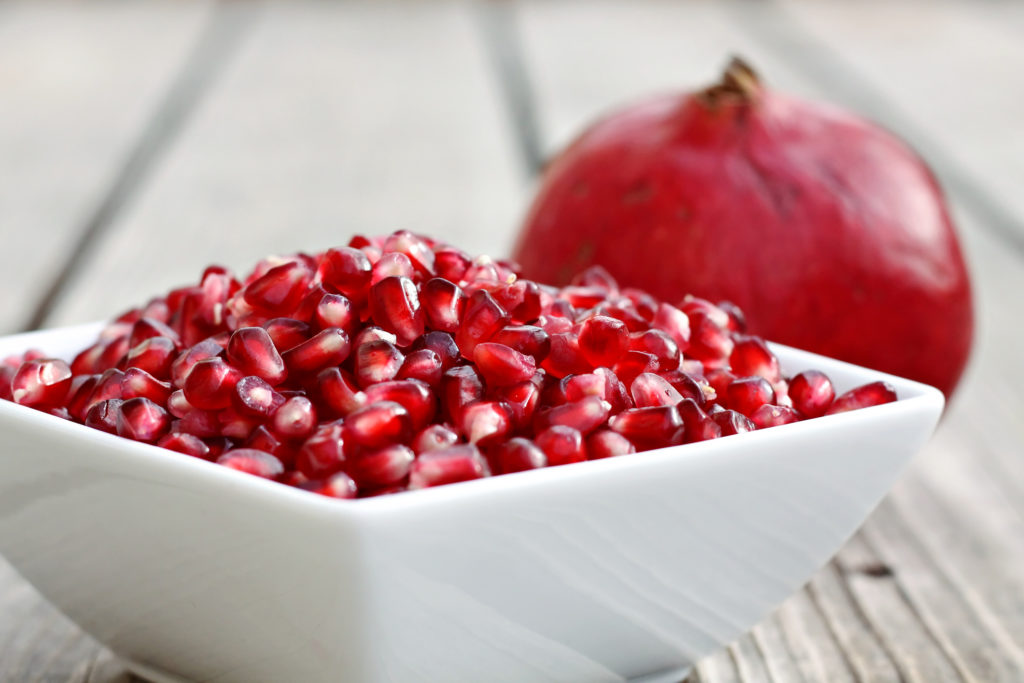6 Pomegranate Health Benefits You Should Know

Admittedly, pomegranates are a bit of an unconventional fruit—you can’t just munch on them casually on your walk back from the gym. But whether you go for the juice or seeds (properly known as arils, that pop out of the husk of the fruit), you’re getting a full blast of vitamins like B, C and K, plus antioxidants, so it’s definitely worth cracking one open. All year round, but especially during cold and flu season, we need some pom in our diet to give our health, and even our energy, a bit of a lift — and here’s why.
1. May reduce cancer risk
“Pomegranate packs a lot of nutrition in its seeds. It has a unique plant compound called punicalagin, which is what we refer to as hemoprotective, as it may help reduce carcinogens from binding to cells,” says Ashley Koff, RD, CEO of The Better Nutrition Program. “In more general terms, it’s safe to say it may help reduce risk of certain cancers,” she explains. Antioxidants are what can protect you from free radical damage, or the leftover waste products from the body’s processes of oxidation — the replenishing of new cells.
2. Can boost heart health
The antioxidants, specifically the plant compound punicalagin, strike again when it comes to preventing heart disease, says Stephanie Middleberg, M.S., RD, a New York City-based nutritionist and wellness coach. An extra heart-health bonus that comes from antioxidant activity in pomegranates is the potential prevention of bad cholesterol solidifying in your bloodstream, Koff adds.
3. Packs fiber to keep you fuller
While pomegranate juice actually has more antioxidants than the individual seeds, “eating the whole fruit offers the benefit of fiber as well as vitamins and minerals. With the addition of the crunch factor, it will be much more satisfying in whole fruit form versus the juice,” says Middleberg.
The fiber in the seeds, even if you toss them in oatmeal or on a salad, is what satiates hunger — it’s about 4 grams fiber per 3/4 cup arils, Koff estimates. “Four grams is a good source of fiber and a delicious way to get to your daily recommendation of 25 to 30 grams,” she says.
4. Bolsters your immune system
It circles back to free radicals again — antioxidants help the immune system regulate itself and fight off harmful free radicals. In addition, the vitamins B, C, and K are also present and work in tandem with the other antioxidant plant compounds to keep your overall health in check, Koff says.
5. Can help keep your memory sharp
This is one benefit that’s still being studied, but according to the Academy of Nutrition and Dietetics, antioxidant-rich foods can have brain-boosting power if you keep them in your diet through your adult life — they encourage blood to flow to the brain, which ultimately helps keep the brain’s function sharp.
6. Helps you deliver at the gym (and recover too)
One benefit of pomegranates you may not have thought of is energy during a workout, and your active recovery period too. “Pomegranates contain nitrates, which is converted to nitrite and can then help support blood flow (vasodilation, widening of the blood vessels),” explains Middleberg.
“This vasodilation essentially helps your body deliver more oxygen to your muscle tissue, improving your athletic ability overall and your ability to recover after exercise.” All the more reason to pop a few pomegranate seeds before the gym — or after, for that matter (add them to the top of your morning avocado toast — just trust us).
The post 6 pomegranate health benefits you should know appeared first on Tribune Content Agency.

